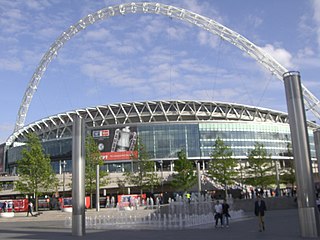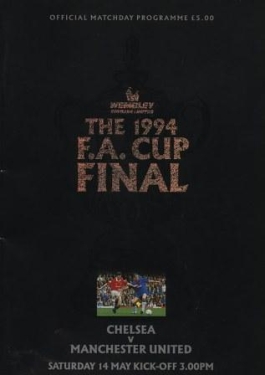
Charlton Athletic Football Club is an English professional football club based in Charlton, south-east London, which compete in EFL League One. Their home ground is The Valley, where the club have played since 1919. They have also played at The Mount in Catford during the 1923–24 season, and spent seven years at Selhurst Park and the Boleyn Ground between 1985 and 1992, due to financial issues, and then safety concerns raised by the local council. The club's traditional kit consists of red shirts, white shorts and red socks, and their most commonly used nickname is The Addicks. Charlton share local rivalries with fellow South London clubs Crystal Palace and Millwall.

Chelsea Football Club is an English professional football club based in Fulham, West London. Founded in 1905, they play their home games at Stamford Bridge. The club competes in the Premier League, the top division of English football. They won their first major honour, the League championship, in 1955. The club won the FA Cup for the first time in 1970, their first European honour, the Cup Winners' Cup, in 1971, and became the third English club to win the Club World Cup in 2022.
Joseph Patrick Jones is a Welsh former international football full-back who most notably played for Liverpool, with whom he won two European Cups.

The FA Cup Final is the last match in the Football Association Challenge Cup. It has regularly been one of the most attended domestic football events in the world, with an official attendance of 89,472 at the 2017 final. The Final is the culmination of a knockout competition among clubs belonging to The Football Association in England, although Scottish and Irish teams competed in the early years and Welsh teams regularly compete, with Cardiff City winning the Cup in 1927 and reaching the final in 1925 and 2008. From 1923 until 2000 it was played mostly at the original Wembley Stadium, and has been played at the current Wembley Stadium since 2007.
The 2000–01 season was the 121st season of competitive football in England.
The Football League War Cup was an association football tournament held between 1939 and 1945. It aimed to fill the gap left in English football by the suspension of the FA Cup during the Second World War. Though it was often referred to in contemporary coverage as the "League Cup" or "Football League Cup", it is not to be confused with the later English football competition with the same name, which was formed in 1960 and is currently known as the EFL Cup. As with all wartime football in England, records and statistics from the competition are not considered official.
1840s – 1850s – 1860s – 1870s – 1880s – 1890s – 1900s – 1910s – 1920s – 1930s – 1940s – 1950s – 1960s – 1970s – 1980s – 1990s – 2000s – 2010s – 2020s

The 1970 FA Cup final was contested by Chelsea and Leeds United. The match took place on 11 April 1970 at Wembley Stadium and ended 2–2, making it the first FA Cup final to require a replay since 1912. The replay was staged at Old Trafford and played on 29 April; after four hours of fiercely contested football, Chelsea eventually won 2–1. To date, this is the last time both the final and replay were scheduled to be played in April; all subsequent FA Cup final ties have been scheduled to be played in May, with only the 2020 FA Cup final delayed and played later due to the COVID pandemic.
The 1989–90 season was the 110th season of competitive football in England.
The 1999–2000 season was the 120th season of competitive football in England.
Donald Welsh was an English football player and manager. As a player, he played at inside left for Charlton Athletic and for England, winning the FA Cup with Charlton in 1946–47.

The 1994 FA Cup final was an association football match that took place on 14 May 1994 at Wembley Stadium in London to determine the winner of the 1993–94 FA Cup. It was contested between Chelsea and Manchester United. Four goals in the second half from Eric Cantona, Mark Hughes and Brian McClair gave Manchester United their 8th FA Cup title.

Wembley Stadium is a football stadium in Wembley, London. It opened in 2007 on the site of the original Wembley Stadium, which was demolished from 2002 to 2003. The stadium hosts major football matches including home matches of the England national football team, and the FA Cup Final. Wembley Stadium is owned by the governing body of English football, the Football Association, whose headquarters are in the stadium, through its subsidiary Wembley National Stadium Ltd (WNSL). With 90,000 seats, it is the largest stadium in the UK and the second-largest stadium in Europe.
The 1981 Football League Cup Final was a football match between Liverpool and West Ham United on 14 March 1981 at Wembley Stadium, London. It was the final match of the 1980–81 Football League Cup, the 21st staging of the Football League Cup, a competition for the 92 teams in The Football League. Both teams were appearing in their second final, and had both lost their first finals in 1966 and 1978 respectively.
The Wartime League was a football league competition held in England during World War II, which replaced the suspended Football League. The exclusion of the FA Cup in these years saw the creation of the Football League War Cup and it was a friendly championship.
The 1943–44 season was Chelsea Football Club's fifth season of wartime football during the Second World War. As the Football League and the FA Cup were suspended for the duration, the club instead competed in regional competitions. Records and statistics for these matches are considered unofficial. Due to the disruption of the war, the club often fielded guest players from other clubs. Chelsea finished 8th in the 18-team Football League South. They also reached the final of the Southern Football League Cup, losing to Charlton Athletic at Wembley.
The 1944–45 season was Chelsea Football Club's sixth season of wartime football during the Second World War. As the Football League and the FA Cup were suspended for the duration, the club instead competed in regional competitions. Records and statistics for these matches are considered unofficial. Due to the disruption of the war, the club often fielded guest players from other clubs. Chelsea finished 4th in the 18-team Football League South, and won the Southern Football League Cup, beating Millwall 2–0 at Wembley. Chelsea also contested a play-off against the winners of the North Football League Cup, Bolton Wanderers, which Bolton won 2–1.

The 1945 Football League War Cup South Final was the last final of the regional Football League War Cup, an unofficial cup competition held in southern England during the Second World War as a replacement for the suspended FA Cup. The match took place at Wembley Stadium on 7 April 1945 and was won by Chelsea, who beat Millwall 2–0. A month later, Chelsea contested a play-off against the winners of the equivalent North final, Bolton Wanderers. The trophy is now on display in the Chelsea museum at Stamford Bridge.

This article documents the history of Chelsea Football Club, an English association football team based in Fulham, West London. For a general overview of the club, see Chelsea F.C.








